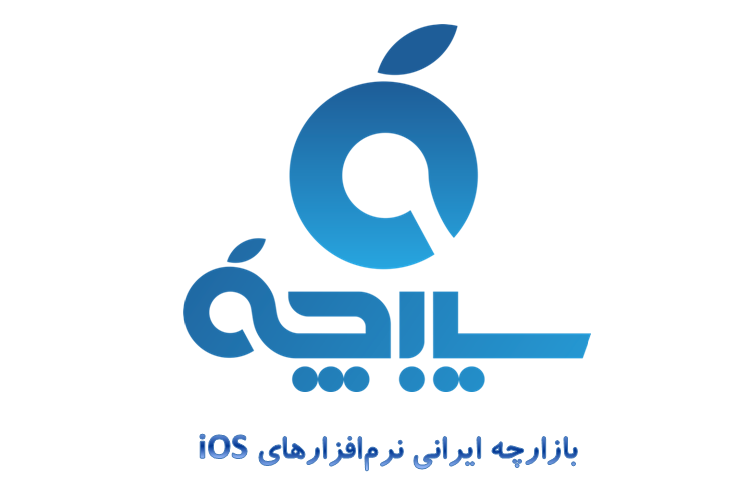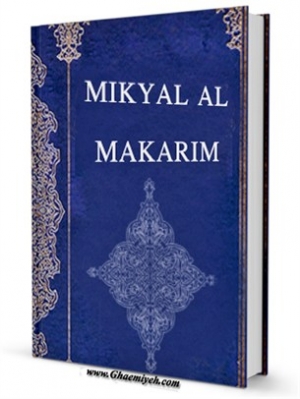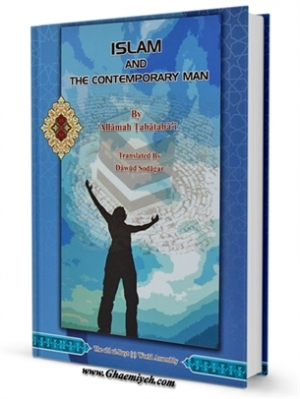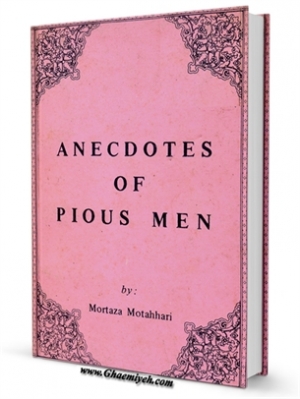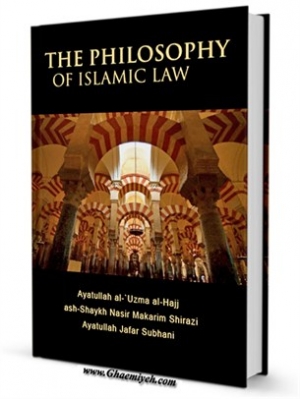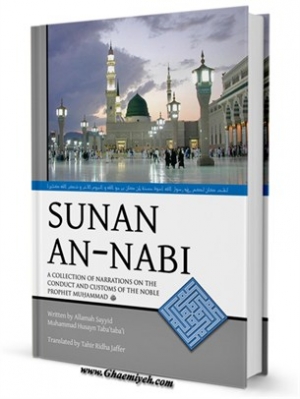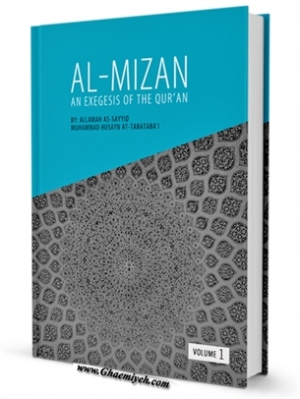Super User
Mikyal al-makarim fi favaede doa lelghaem is an Arabic book written by Sayyed mohammad Taghi Mosavi Isfahani in 1330(lunar) and contains issues such as the reasons, advantages and the results of praying for Imam Zaman (A.S) and the duties of his followers in absence era.
The author dreams Imam Zaman (A.S) and visits him while he was sleeping and by the order of him he begins writing this book and chooses the current name by Imam Zaman's saying.
One of the features of this book is that by logical and narrative reasons proves that praying for Imam Zaman (A.S) is one of the most significant means to reach to supreme levels of improvement and top stages of spirituality'; additionally it has benefits in daily life.
Structure
The book has two volumes divided in 8 sections. It states logically the benefits of praying for revealing the representative of God on the earth and by narrating various traditions emphasizes the necessity of supplication for the savior of human beings.
The obligation of knowing Imam, miracles and dignity of Imam Zaman (A.S), results of supplication, the suitable times and places for praying, the way of praying and features of him are the most important matters of this book. And the characteristics of him are listed according to alphabets.
The author has collected the supplications of different times due to Ahlelbayt traditions.
Mikyal contains various and significant issues in different fields such as Hadith, jurisprudence, theology, Rejal and even philosophy and literature which are gathered in an innovative way and correct conclusions.
Most of materials which are investigated regarding belief of Imam Mahdi are titled by praying before God for saving him from disasters and sorrow.
Contents
In the first and second sections through logical and narrative reasoning it is proved that the faith is not valid without knowing Imam Zaman (A.S).
To prove the imamate of him some parts of repetitive traditions which are particularly about imamate of him are narrated and some miracles and dignities are collected as well.
The third part attributes to rights of Imam towards people like right of existence, the right of kinship ties to prophet, the rights of scholar over learners.
The forth section states the characteristics of him which result to necessity of praying. They are listed alphabetically and some of them are: faith to God, keeping the Hojjats up, making the hearts close together, revenge of Imam Hussain's blood, gathering all wises, supporting of Islam, ending up of sciences to him and praying of him for believers.
In the fifth section the result of praying for Imam Zaman is mentioned and the author by pointing to this fact that this book is authorized for this subject, firstly answers some questions such as why when Imam is the means for blessing to come down for creatures and he does not have any need to people therefore what can be point for praying for Imam Zaman (A.S)?
In addition to investigating the necessity of praying in a strong reasoning way argues about other interesting issues in different teachings and sciences which really indicates that the author has been a knowledgeable and noticeable person.
The sixth and seventh sections are about the best times, statues and places which are emphasized more such as the latest hours of Friday, the time befoe praying for ourselves, holy shrines. And has mentioned the way of praying and points out that reaching to all benefits and advantages are obtained when praying is constantly done.
The eighth part counts the duties of servants towards him; such as understanding the features and characteristics of him, politeness before him, making people to love him, anticipating his presence, making believers happy, tolerating the bother of others.
As a result we can claim that the author tries to waken Muslims' insights for preparing them towards the existence of Imam Zaman (A.S) and cures people's hearts and provides a capacity to make a progress for getting for the savior of all human beings.
According to high and precious teachings of Quran every human who enters to this world is inherently monotheistic and undoubtedly knows God as the creator of the whole world, but sometimes occurs some different reasons and problems which put in danger the nature of God-knowing. Though the almighty Allah through sending prophets towards us helps us in this case by protecting in dangerous situations against aberration. After prophets, Imams have the responsibility and in following scholars are in charge of that.
The current book titled by "Islam and contemporary human" is a collection of answers to various problems such as scientific, philosophical, ethical, religious, etc. ones. The top feature of this book is being up-to-dated and having the manner of logical and traditional.
The Perfect Man is a book which contains the text of Mr.Motahari's lectures which were given in 1353 (solar) before a group of college. These lectures were given in a situation which social orders were more important than spiritual aspect of Islam.
The martyred master through his comprehensive attitude has set these issues to introduce the complete human in Islam, the multi-dimension human which contains all orders of divine religion and to prevent youngsters from one-dimension view to Islam.
The manner of the author has been a comparative one which clarifies the thought of Islam in comparison to other religions.
What's the meaning of complete human? What do other religions define it?
What are the ways to know the complete human?
What are the criterion of other religion?
What does Islam introduce as a criteria for completion of human and which human is known complete?
What are the spiritual and mental flaws of human?
Can we accept the meaning of the famous sentence "Worshiping is nothing but serving people"?
The author after investigating different thoughts in religions about complete human, criticizes them and then states Islam thought.
Investigating and criticizing thought of mysticism
Investigating and criticizing thought of rationalism
Investigating and criticizing thought of school of power
Investigating and criticizing thought of school of love
Investigating and criticizing thought of socialism
Quran has emphasized strongly on knowing God through setting all the creatures around the world a sign to lead to God. Also he has emphasized on knowing human himself. It means that for knowing human there is something more precious sign which is human himself. Self-recognition is the top level of recognitions that ends up to recognition of God. There are traditions from Imams that say self-recognition is the most helpful knowledge and again say whoever recognized himself indeed he has recognized God. Therefore self-recognition is the best knowledge and most helpful recognitions. This book through Quranic and philosophical viewpoint talks about self-recognition concept and this is the first books of Mr.Mesbah Yazdi which has been published 30 years ago.
The book contains issues such as recognizing the completion, philosophical thoughts about completion, approaching to God, reality of worshiping and other things.
The story either in text or verbal has a long antiquity in our culture. Stories with champions from sky or over the earth who were struggling with matters created by the authors. Over the time stories have been written describing the lives of high-level and famous personalities. Also there are various and short religious tales among tradition and hadith books. Before Mr.Motahhari these tales were scattered through books but were gathered by people like him. As Mr. Motaharri mentions in the preface of his book, as long as he has felt the importance of these tales started to gather the stories of moral and popular personalities by developing in some aspects from books. Educative stories with real personalities and events if narrated with simple words can have a great impact on the path of moral and social up bring, although the author was faced with oppositions. Opposing of people who consider such works low for someone like him. As the author says, such obstacles have caused us to have less religious books in these fields. Some people do not watch the significant impact of those books though they spend years to print books which are important in their viewpoint even if they are useless for people.
As long as this book indicates the life of people who want to step on the right path the author has named it "Dastane Rastan" which means "the tales of righteous people". Its way of writing is simple which is perceivable for all.
A prose which facilitates literal difficulties for understanding. The author believes that a good story is the one which makes the reader to think and should not be easy to reach to conclusions readily; because if an issue was not tied with the soul of the reader and he doesn't add any thoughts to that, that would not have an impact on his actions.
Because of that Mr. Motahhari has tried to state the stories generally and prevents to point out the moral results directly due to respect the thoughts of reader and makes him to think. Titles of the stories are selected in a way which the end of the story in not clear. The author has had this in his mind that the stories have a better attraction for the addressees and not to such a moral statement. By the use of form of the tales regarding the main points of the story the author has developed the story due to better attraction for readers something that is close to rewriting of today, of course a rewriting that is remained close. The selection of stories regarding the personalities has not been fanatically, beside to Muslims non-Muslims have also come along.
After this innovation of the author restating of religious stories began and nowadays the stories are printed in short, long and as a collection.
This book is written by Ayatullah al-`Uzma al-Hajj ash-Shaykh Nasir Makarim Shirazi and Ayatullah Jafar Subhani. Syed Athar Husain S.H. Rizvi is the translator of the book into English. It is published by the Islamic Seminary Publications.
Islam has ordered some things and refrained from others. The basis of this has some purpose and Islamic laws are not imposed without any reason. For example foods and drinks, the lawful relations and other things, all have some benefit or harm hidden in them. Whether the laws about them are made or not, there is no difference of their effects. If you ponder on the things, which are forbidden, you will come to know that the things, which are intoxicating like alcohol etc, are themselves harmful. Interest is just acquiring wealth of the people and it is like a trap.
Therefore wine and interest are forbidden because of their innate harmful effects. On the other side when you look at things, which are obligatory you will feel that all the worship acts for example, Prayer and Zakat are obligatory because of the benefits that people acquire from them. In short that Islamic law is based on benefits or harms or on their goodness or evil. Many things can be understood from science and experience. This type of research or to know the logic behind any Islamic law or to ask any questions regarding it is not disallowed.
The curiosity of a human being leads to finding of truth and his real spiritual want and also it opens the door for progress. It is a lively sign for man that he tries to acquire the things, which are unknown and hidden to him. This is the reason that people who don't question about things lag behind and do not prosper. In the view of Islam the benefits of “Questioning” brings progress and perfection. Islam not only gives its followers the right to question the different topics but also the true guides of Islam have invited people to ask questions.
The world must have not forgotten the famous sentence of the great preacher who said, “ask me whatever you want to ask.” The progeny of the Holy Prophet (s.a.w.a.) has answered the questions of their followers. Not only those followers got satisfactory answers that increased their thinking power but also today those in search for truth can use this valuable treasure of knowledge from the progeny of the Holy Prophet (s.a.w.a.).who want to understand the Islamic laws according to reason and traditions.
In this book, the authors have endeavored to reply to over a hundred commonly asked questions about Islamic laws and practices and have also explained the reasons being various Islamic directives.
This book is written by Sayyid Saeed Akhtar Rizvi and published by Bilal Muslim Mission of Tanzania.
The word ‘Nabi’ (نبی)is derived from ‘Nubuwwat’ (نبوه). ‘Nubuwwat’ means ‘to be high’ and, thus ‘Nabi’means a ‘High person’: high in the presence of Allah, The word ‘Nabi’ shows the exalted position of the prophet which he enjoys in the presence of God. Another interpretation of 'Nabi! is that it is derived from 'Nubu-at i.e., to prophesize. According to this interpretation 'Nabi' means one who prophesizes. The word 'Rasul' (رسول)is derived from 'Risalat' (رساله).
'Risalat' means to send; and 'Rasul' means one who is sent. Thus the word 'Rasul' means 'one who is sent from Allah.’ According to Muslim terminology. 'Nabi' means 'A man sent directly by God to the mankind to lead them to right path.’ The word 'man' excludes the angels who are sent by God for various purposes, but they are not called Nabi or Rasul in Islamic terminology. Also, it excludes women. A woman cannot be a Nabi or Rasul.
The phrase 'sent directly' shows that the Nabi does not get his inspiration or revelation through the agency of any other man. By this phrase we differentiate between Nabi and Imam, because Imams also are 'sent by God to the mankind to lead them to the right path' but they are sent through the prophet; thay get their directions through the prophet, not 'directly' from God.
As explained above, a Nabi was the highest person of his time in the eyes of God. It was necessary that the Nabi and Rasul be from amongst man-kind; because if Allah were to send an angel to lead mankind, people would have felt shy of him, as he would have been a stranger. That is why God always sent Nabi and Rasul from amongst the mankind.
The Nabi or Rasul resembles human beings in his body, appearance and needs; but his spiritual perfection is so great, his soul is so pure and his mind so receptive of the messages of Allah that, metaphorically, he can be said to be quite different from other human beings. For a clear example of his spiritual perfection surrounded by the human needs, ha may be likened to a mirror. A mirror has two sides one is the bright side, the other is the dark side. If we put a mirror directly under the sun, it receives the light and reflects the rays to the farthest corner of a room. Likewise a Nabi or Rasul, because of his spiritual perfection, received the messages of Allah, and by his human body conveyed it to the mankind—to his people.
This short booklet discusses the essential nature of Nubuwwah (Prophethood), why infallibility (ismah) is needed for such a position, and follows this by sections on prophecies about the Holy Prophet and the miracles of his prophethood.
Sunan al-Nabī (Arabic: سنن النبی) is a book written by 'Allama Tabatab'i in order to be an introduction to the traditions of the Prophet (s). This book originally is in Arabic and it has 21 chapters and it has been translated into Persian, English and Urdu.
'Allama Tabataba'i by taking this verse "certainly you have in the messenger of Allah an excellent exemplar" (33:21) as a principle, wrote the book to be an introductory to general moralities and manners of the Prophet (s) which is all in all called "tradition of the prophet (s)". He wrote in the book:
This book is a collection of narrations about traditions of the prophet (s) which includes his practical manners and the actions he (s) used to regularly perform and were important to him (s)
The book also contains an appendix about the prophet's appearance. In this regard 'Allama Tabataba'i says at the preface:
We also mentioned some of the narrations about his (s) appearance Even though it was out of the subject because of receiving bless and also because they have indicated some of his (s) manners and moralities.
Content
In this book the minor incidents has not been mentioned and 'Allama Tabataba'i sufficed to mention general points about the moralities of the Prophet (s). In order to have a concise book, 'Allama Tabataba'i omitted the chain of transmitters but differentiated between Musnad (hadith with transmitter chain) and Mursal (hadith without transmitter chain) hadiths and mentioned the source texts for researchers to be able for further studies.
Almizan is an Arabic exegesis of the Quran in 20 volumes which is written by Allame Mohammad Hussein Tabatabayi.
Since the time he started teaching in Howze-elmiyeh of Qom, he had the motivation of beginning of an exegesis. Eventually it was begun by insistence of his students.
Writing of this book lasted 17 years from1333 to 1350 (lunar month).
Structure
The first volume contains a preface written by the author and the interpretation of surah Hamd and 182 verses of surah Baqarah(the cow), and the other volumes explain and interpret the other sections of Quran.
Contents
This book is known as one of the main and significant resource of Islamic culture and teaching in last century. It is indeed a comprehensive collection involving deep Quranic, hadith, philosophical, mystical, literature, ethical, historic, social, etc matters which are gathered in an innovative and researching way. This exegesis has unique features that could not be found over the history of interpretation of Quran including: external and spiritual aspects, caring of correct Quranic measures, differentiating between different methods of exegesis, criticizing other ideas and so on.
Allame Tabatabayi after investigating different methods of interpretation concludes that all these methods have a significant short-coming and that is imposing the results of philosophical and scientific matters which are out of the meaning of verses and in this case exegesis loses its concept and that would be adapting rather than interpreting, and plenty of Quran's facts would be ignored and some verses, misunderstood.
The author in the preface takes a look at the history and methods of interpretation. He states his attitude about exegesis and the method he follows, and mentions the huge difference of his method with other groups of interpreters and criticize and refuse them such as Akhbariha who invalidate our understanding from Quran and limits interpretation through traditions and they go further and come to this belief that the Quran is not understandable for us. The writer believes that the method of Ahlelbayt to interpret is exegesis of Quran by its own and in this case refers to different samples in his book.
Method of Allame Tabatabayi
The author's manner in his exegesis is that firstly mentions some verses of surah and afterwards starts a part titled explanation of verses (Bayane Ayat) that consists of matters attributed to subjects of the verses. In this part there are literal and literary matters and explains the meaning of verses regarding similar verses and mentions the meanings understood implicitly. In the next part narrates traditions and in some cases criticizes. Different Shia and Sunni sources are used. Moreover independent subjects are significant; because deep and boarded issues in theology, philosophy, ethic, Quranic lessons, jurisprudence and social matters are argued.
Allame himself in the preface of his book mentions a condensed conclusion as the result of his interpretation:
Teachings attributed to names and features of God such as life, knowledge.
Teachings attributed to God's actions like creating, order, wanting, leading.
Teachings attributed to means between God and human beings like hijabs, Loh, Arsh.
Human beings before the world
Teachings about human in this world like history of human beings, knowing human, knowing social rules, prophecy, revelation, Quran, religion.
Teachings attributed to human beings of after this world; Barzakh and hereafter
Teachings about ethics
In the following of each part there are various narrations of prophet and his progeny from Shia and Sunni sources and has stated philosophical, scientific, historic, social and ethical subjects.
The author does not argue about jurist verses.
Status of the book
The Persian translation of this book is written by a group of scholars -in Howze of Qom in 40 volumes- who are Naser Makarem Shirazi, Mohammad Javad Kermani, Mohammad Taghi Mesbah Yazdi, Mohammad Reza Salehi Kermani, Seyyed Mohammad Khamenie, Abdlolkarim Borujerdi. And there is another translation in 20 volumes done by Mohammad Bagher Mosavi Hamedani.
Almizan has also translation in other languages such as English, Urdu, Turkish and Spanish. The English translation starts from the beginning until the 76th verse of Surah Nissa.
There is a summary translation of Almizan done by Fatimah Mashayekh. This book starts from Surah A'araf and ends by Surah Hud. The author has tried to include the main issues of Almizan for youths.





